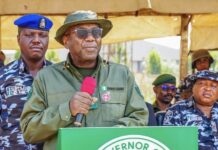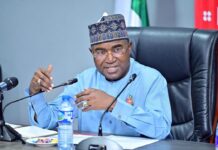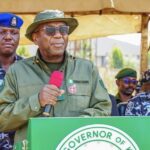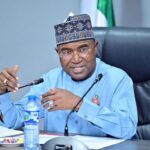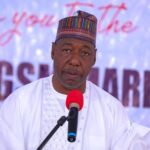This piece is about character, trust and loyalty. It is about how these linked qualities define the character and style of Abdulfatah Ahmed, ex-banker and immediate past governor of Kwara State.
For starters, leadership is about showing direction, leading the way and doing good for others.
In that context, competence, credentials or character create trust in leadership. Trust engenders confidence in leadership which births the rancour-free environment germane to development. Finally, loyalty speaks to allegiance either to a group, person or one’s virtues. Five years ago, the Senate questioned Minister of Works and Housing, Raji Fashola (SAN) about a conflict of interest between his benefactor, and his then-new boss. Fashola’s now celebrated response was cryptic but loaded: May our loyalty not be tested.
Fast-forward three years to the stormy prelude to the last general elections. Media reports quote former Oyo State Governor Abiola Ajimobi, caught in fierce jostling for his successor, wistfully expressing a wish for a successor as “loyal as Abdulfatah Ahmed”, whose two-terms as Governor of Kwara State was ending. Ajimobi’s dream was unfulfilled. But his desire wasn’t lost on political pundits. He was referring to Ahmed’s widely admired loyalty to political leadership, to the structure that brought him to power.
However, framing Ahmed’s style as loyalty to political leadership misses the point. As an astute student of power and ardent observer of Kwara’s, I have a different sketch of Ahmed, curated from his words and his associates’ recorded accounts of his character. Apparent here is a reliable character nurtured from childhood, honed through his professional career, and exhibited as a politician. These values, they remark, make his word a sacred bond, trustworthiness a way of life and people-focussed leadership mandatory.
Contrary to the perception that he was under the thumb, Ahmed was true to character: keeping his word, upholding agreements and maintaining integrity.
Politically, an innate inclination to keep his word rather than loyalty to the leadership, shaped Ahmed’s eight-year tenure.
That Kwara State enjoyed peace during those eight is a potent testament to Ahmed’s character as a mature, humble, accommodating and loyal politician.
Anecdotes tell of a Governor who resisted all opposition entreaties, including from the highest levels of government, to jump ship in the years leading to the 2015 elections. Mindful of his bond and consistent with his expressed loyalty, Ahmed stuck to his political allegiance. A few years later, his loyalty was tested again as the party leadership mandated another political realignment. It is unknown if Ahmed had misgivings about returning to his former party. If he had any, the former governor brushed those qualms aside. Driven again by loyalty to his values, Ahmed joined his political group in decamping to his former political home. This preference for consensus and inclusiveness on Ahmed’s watch made Kwara turbulence free, stabilising the state, ensuring its peace and insulating it from the orgy of political violence that previously characterised the State of Harmony.
Based on these accounts, Ahmed’s character, as a reliable man was apparent in his stint as Kwara’s Chief Executive.
Riding into office on the back of continuity, whose rarity in governance created a graveyard of abandoned projects nationwide, Ahmed upped his trust quotient by spending a lot of money on completing infrastructure projects that he met on ground.
In breaking the jinx of abandoned projects in Kwara State, Ahmed signalled that Kwarans were right to trust him with leadership. For Ahmed, doing otherwise will have meant letting Kwarans down, flushing their trust and resources away with the still-born projects. Instead, chasing after ‘legacies’, Ahmed showed the triumph of prudence over selfish politics, keeping his ego in check, and putting Kwara first.
But leadership is also enablement. It is about creating opportunities for individuals and their families to make a decent living, send their children to school, access good hospitals when sick and travel on paved roads. In Ahmed’s Kwara, these efforts were clear in youth jobs, money for small businesses, upgraded health systems, better education for more people and improved infrastructure. The administration is on record as implementing one of the most successful entrepreneurship schemes in the country under its SME program.
The former governor empowered his people, gave them a sense of belonging, instilled hope. Kwarans remember the strides in human capital development, featuring the expanded health insurance scheme and the much-hyped, IVTEC.
Ahmed also made sure not to let down Kwarans who trusted him not to turn the state into a dangerous political battleground, avoiding the acrimony frequent elsewhere.
Not minding the economic turbulence, Ahmed craftily stabilized the state for development and reform. His feat in reforming revenue generation remains a reference point for other states seeking increased revenue.
In pooling tax money for building schools and roads, Ahmed also insulated Kwara infrastructure from economic troubles, making sure government paid contractors on agreed dates. Ex-Governor Ahmed pulled these off because he was smart enough to manage Kwara’s lean resources but also because he stabilized the state politically. Unfazed by power, unusually humble and personable, he was faithful to his cherished values of trust and integrity, maintaining Kwara’s reputation for harmony.
Out of power, Maigida, as his supporters call him, is as renowned for his reforms as he is for consistency of character. Even opponents salute Ahmed as dependable and consistent. In a political climate in which betrayal and ideological prostitution are typical, Ahmed deserves accolades for sticking to his values, bucking the trend. Such brilliance and sterling character should become yardsticks for leadership recruitment in Nigeria.







